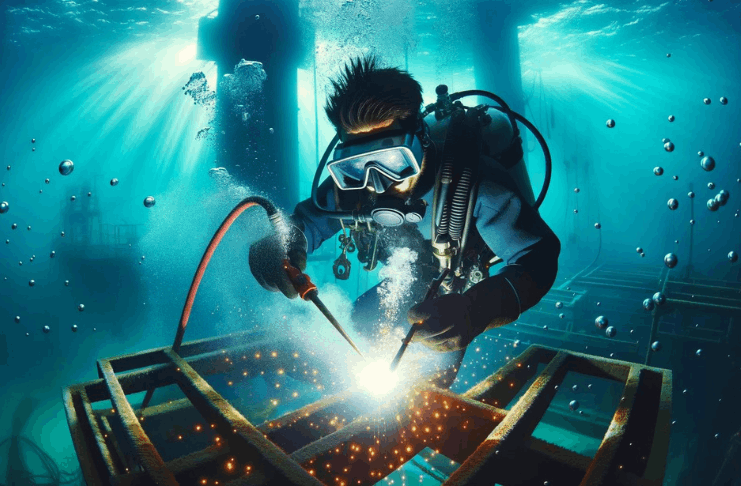Underwater welding is often associated with the promise of high earnings, attracting many hopefuls. However, the reality behind these expectations warrants a closer look.
In this article, we’ll delve into the truth about underwater welder earnings, dispelling myths and providing a realistic perspective on this profession’s financial aspect.
Understanding Underwater Welding
Underwater welding combines welding and diving skills, where welders work beneath the water’s surface to repair structures like pipelines, bridges, and ships.
It involves using specialized equipment and techniques to join metals in a challenging underwater environment, with tasks ranging from inspections to structural repairs. Safety and precision are paramount in this demanding profession.
The Unique Challenges and Risks Associated With the Job
Underwater welding is a unique profession that presents distinctive challenges and risks. Here are some of the critical factors to consider:
- Harsh Underwater Environment: Limited visibility, extreme pressure, and varying water conditions make the job physically and mentally demanding.
- Safety Hazards: Electric shock, explosion, and equipment malfunctions pose severe risks to underwater welders.
- Health Concerns: Extended exposure to cold water can lead to hypothermia, and the job may involve working with hazardous materials.
- High Level of Skill: Underwater welders must master both welding techniques and diving skills, making entering a demanding profession.
- Job Market and Mobility: The job can require extensive travel and may only sometimes offer consistent employment opportunities in certain regions.
Expected Earnings
Underwater welding salaries often carry misconceptions that can lead to unrealistic expectations. Here are some common misconceptions to dispel:
- Astronomical Earnings: Many believe underwater welders earn exceptionally high wages from the start, often different due to various factors such as experience and location.
- Consistent Work: There’s a misconception that underwater welders enjoy continuous employment throughout the year when, in reality, job availability can fluctuate.
- Quick Wealth Accumulation: Some assume that underwater welders can quickly amass wealth, but the truth is that it may take time to build experience and reputation, leading to higher pay.
- Standardized Earnings: Another misconception is that salaries for underwater welders are uniform across the industry, disregarding the influence of factors like location, project complexity, and employer policies.
- Lack of Education Requirements: There’s a belief that underwater welding offers high-paying jobs without the need for extensive education or training when, in fact, rigorous training and certifications are essential for safety and career advancement.
Factors that Contribute to High-Earning Potential
While underwater welding may not guarantee astronomical earnings, certain factors can significantly contribute to higher income potential in this profession. Here are some key factors to consider:
- Location: Geographic locations with a high demand for underwater welders, such as offshore oil rigs or shipyards, often offer more lucrative opportunities.
- Experience: As with many professions, underwater welders with years of experience typically command higher salaries due to their expertise and track record.
- Specialization: Diversifying skills to include specialized techniques like hyperbaric welding or offshore welding can open doors to higher-paying and more challenging projects.
- Certification: Obtaining relevant certifications and endorsements, such as AWS (American Welding Society) underwater welding certifications, can increase earning potential and job opportunities.
- Employer and Industry: Working for reputable employers in industries like oil and gas or underwater construction can lead to better compensation packages and job security.
Reality Check
Understanding the realistic salary expectations at the entry-level is crucial for those embarking on a career in underwater welding. Here, we outline the salary ranges that newcomers to this demanding profession can anticipate:
- Low End: Entry-level underwater welders can expect to earn between $25,000 to $40,000 annually, depending on factors like location and employer.
- Mid-Range: With some experience and certifications, mid-range salaries typically fall within the $40,000 to $60,000 range, offering a steady income as skills develop.
- High End: Highly experienced underwater welders with a strong reputation and specialized skills can earn upwards of $100,000 annually, especially in areas with high demand for their expertise.
How Experience Impacts Income Growth
In underwater welding, experience is a significant driver of income growth. As divers and welders accumulate time in the field, their earnings tend to follow a distinct trajectory:
- Entry-Level: Novice underwater welders, typically with 0-2 years of experience, start at the lower end of the salary scale, often earning between $25,000 to $40,000 per year.
- Intermediate Level: With 2-5 years of experience, underwater welders can expect a notable boost in earnings, typically ranging from $40,000 to $60,000 annually, as they become more proficient in their craft.
- Experienced Professionals: Those with over five years of experience, including specialized certifications and a strong track record, can see their income rise significantly, with some earning upwards of $100,000 per year. Reputation and expertise play a crucial role at this stage.
- Consulting and Training: Seasoned professionals can also explore opportunities in consulting or training roles, where they can earn even more by sharing their knowledge and expertise with the next generation of underwater welders.
The Role of Certifications and Skills in Salary Negotiations
Certifications and skills are pivotal factors in determining the earning potential of underwater welders. They enhance safety and play a vital role in salary negotiations. Here’s how:
- Certifications: Acquiring recognized certifications such as AWS (American Welding Society) underwater welding certifications can significantly boost an underwater welder’s earning potential, often leading to higher-paying job opportunities.
- Advanced Skills: Specialized skills, like hyperbaric welding or underwater cutting techniques, can make an underwater welder more valuable to employers, allowing them to negotiate higher wages.
- Diver Training: Diver certifications from organizations like the Association of Commercial Diving Educators (ACDE) can enhance an underwater welder’s versatility and earning power.
- Safety Credentials: Safety certifications, such as OSHA (Occupational Safety and Health Administration) training, demonstrate a commitment to safety practices and can be an asset during salary discussions.
- Continuing Education: Staying updated with the latest welding techniques and technologies through ongoing education and training can position underwater welders as more valuable assets, justifying higher salaries.
Additional Considerations
When contemplating a career in underwater welding, it’s essential to consider various factors beyond earnings. These additional considerations can significantly impact your overall experience in the profession:
- Health and Physical Fitness: Underwater welding demands good physical health and fitness, as the job can be physically strenuous and requires the ability to work in challenging underwater conditions.
- Travel and Location: Depending on your preferences, assess whether you are comfortable with frequent travel or relocating to regions with high demand for underwater welding services.
- Lifestyle and Work-Life Balance: Consider how the irregular work schedules and time spent away from home might affect your personal life and relationships.
- Safety and Risk Tolerance: Acknowledge the inherent risks of the job and assess your comfort level with safety protocols, as well as your ability to remain calm under pressure in emergencies.
- Long-Term Career Goals: Reflect on your career aspirations, whether you aim to specialize, advance into supervisory roles, or transition to related careers like marine engineering or project management.
The Bottomline
In underwater welding, dispelling misconceptions about earnings is vital for career clarity. While the allure of high income is natural, it’s tempered by variables like experience, location, and specialized skills.
Keep your expectations grounded and your dedication to safety and learning unwavering as you navigate this distinct profession.













